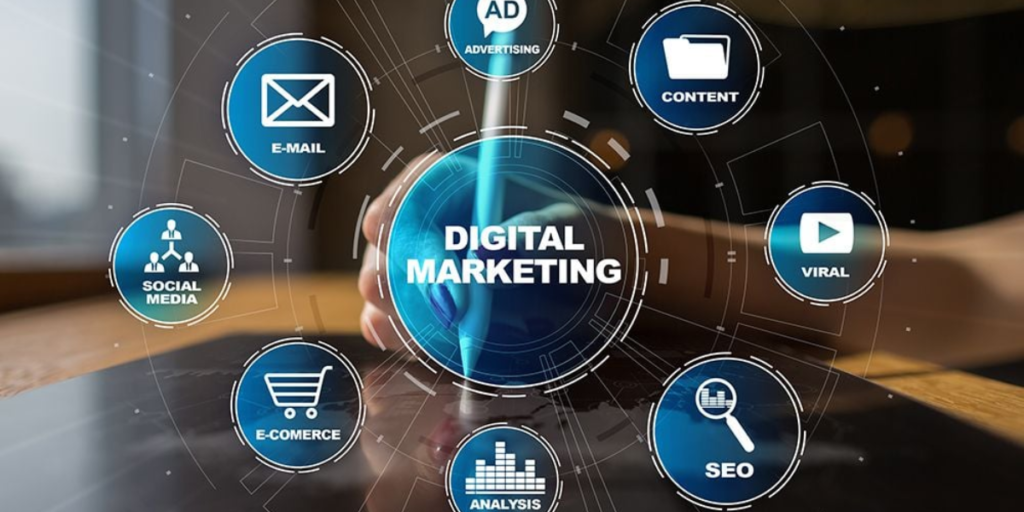In today’s digital age, implementing effective digital marketing strategies is crucial for the success and growth of small businesses. By harnessing the power of search engine optimization (SEO), social media marketing, email marketing, and content marketing, small business owners can elevate their online presence, attract the right audience, and drive conversions. This article provides an overview of these strategies, offering valuable insights, practical tips, and examples tailored to small business owners.
I. Understanding the Basics of Digital Marketing
Digital marketing encompasses a range of online tactics aimed at reaching and engaging target audiences. It allows small businesses to connect with their customers, build brand awareness, and drive traffic to their websites. By leveraging digital marketing strategies effectively, small business owners can therefore gain a competitive edge and achieve their business goals.

II. Search Engine Optimization (SEO) for Small Businesses
To improve online visibility and organic rankings, small business owners need to prioritize SEO. Conduct thorough keyword research to identify relevant keywords and incorporate them naturally throughout website content, meta tags, and headings. Optimize on-page elements, such as title tags, meta descriptions, and URLs, using targeted keywords. Additionally, focus on creating high-quality, valuable content that attracts backlinks and encourages social sharing.

III. Social Media Marketing Strategies for Small Businesses
Social media platforms offer an excellent opportunity for small businesses to connect and engage with their target audience. Start by identifying the most relevant social media channels for the business, considering factors such as audience demographics and platform functionality. Create a content calendar and share valuable and engaging content regularly. Utilize paid advertising options on social media platforms to target specific demographics and increase brand visibility.

IV. Email Marketing Tactics for Small Business Success
Email marketing remains a powerful tool for nurturing leads, driving conversions, and building customer loyalty. Start by building an email subscriber list through lead generation strategies, such as offering valuable content in exchange for email addresses. Craft personalized and engaging email campaigns that address the pain points and interests of the target audience. Leverage automation to send targeted emails based on customer behavior and preferences.

V. Content Marketing Strategies for Small Business Growth
Content marketing allows small businesses to establish authority, educate their audience, and attract organic traffic. Develop a content marketing strategy aligned with business goals, target audience, and keyword research. Create high-quality content in various formats, such as blog posts, videos, infographics, and podcasts. After that, promote the content through social media, email marketing, and collaborations with industry influencers. And most importantly, don’t forget to monitor the content performance using analytics to make data-driven optimizations.

VI. Cost-Effective Digital Marketing Tips for Small Business Owners
Small business owners often operate on limited budgets, making cost-effective strategies essential. Firstly, start by utilizing free or affordable digital marketing tools and resources to streamline processes and maximize results. Secondly, leverage the power of online communities and engage with customers and industry experts through social media and forums. Thirdly, track and analyze key metrics to measure the return on investment (ROI) and adjust strategies accordingly. Moreover, collaborate with influencers and form strategic partnerships to extend reach and leverage their audience.

Conclusion
In conclusion, implementing effective digital marketing strategies is vital for small business owners to thrive in the digital landscape. By harnessing the power of SEO, social media marketing, email marketing, and content marketing, small business owners can elevate their online presence, attract their target audience, and drive conversions. In addition to that, staying up to date with industry trends and continuously adapting their strategies, can help unlock significant growth opportunities.
Frequently Asked Questions
Q1: How long does it take to see results from digital marketing strategies?
A: The timeframe for seeing results from digital marketing strategies can vary based on various factors such as the competitiveness of the industry, the quality of the strategies implemented, and the target audience. Generally, small business owners can expect to see noticeable improvements within 3 to 6 months of implementing effective digital marketing strategies. However, it’s important to note that digital marketing is an ongoing process, and results can continue to improve over time with continuous refinement and adaptation.
Q2: How can I measure the effectiveness of my digital marketing efforts?
A: Measuring the effectiveness of your digital marketing efforts is crucial to understanding what strategies are working and where adjustments may be needed. Here are some key metrics to consider:
- Website Traffic: Monitor the number of visitors to your website, as well as the sources of that traffic (organic search, social media, referrals, etc.).
- Conversion Rate: Track the percentage of website visitors who take a desired action, such as making a purchase, signing up for a newsletter, or filling out a contact form.
- Engagement Metrics: Analyze metrics such as social media engagement (likes, comments, shares), email open rates, and click-through rates to gauge audience interaction with your content.
- Return on Investment (ROI): Calculate the return on investment by comparing the revenue generated from your digital marketing efforts to the cost of implementing those strategies.
- Customer Lifetime Value (CLV): Determine the value a customer brings to your business over their lifetime to assess the long-term impact of your marketing efforts.
By regularly tracking and analyzing these metrics, you can gain valuable insights into the effectiveness of your digital marketing strategies and make data-driven decisions to optimize your campaigns for better results.
Q3: Are there any low-cost digital marketing tactics I can implement for my small business?
A: Absolutely! Small businesses can leverage several low-cost digital marketing tactics to maximize their budget. Here are a few ideas:
- Social Media Management: Create and maintain a strong presence on social media platforms to engage with your audience and promote your products or services. Social media accounts are generally free to set up, and you can organically grow your following by sharing valuable content and interacting with your audience.
- Content Marketing: Develop a content marketing strategy that focuses on creating high-quality, informative, and engaging content. Blogging, creating videos, or starting a podcast can be cost-effective ways to attract and engage your target audience.
- Email Marketing: Utilize email marketing platforms that offer free plans or affordable pricing tiers to build and nurture your subscriber list. Craft personalized and targeted email campaigns to nurture leads, promote offers, and maintain customer relationships.
- Local SEO: Optimize your website and online listings for local search by including location-based keywords, updating your Google My Business profile, and obtaining positive customer reviews. Local SEO strategies can help improve your visibility in local search results without significant costs.

Remember, even with low-cost tactics, investing time and effort into creating high-quality content and engaging with your audience is essential for success. It’s about finding the right balance between cost-effective strategies and delivering value to your target audience.
By implementing these strategies and staying consistent in your efforts, small business owners can establish a strong digital presence, reach their target audience effectively, and achieve long-term success in the competitive online landscape.

